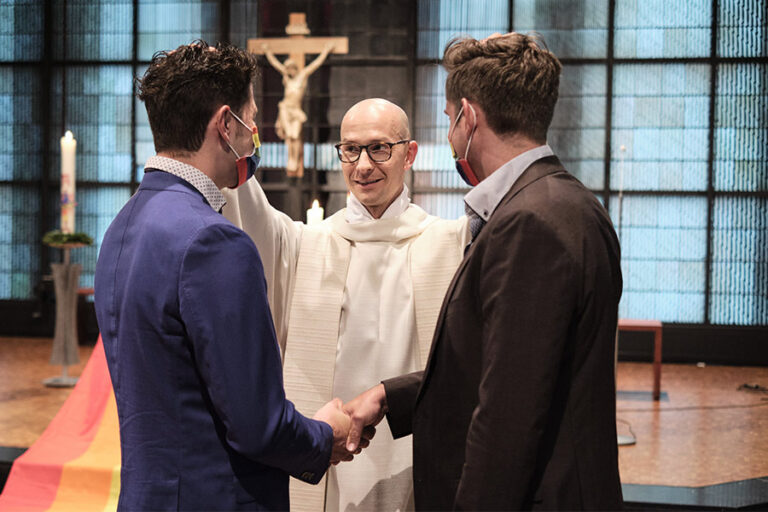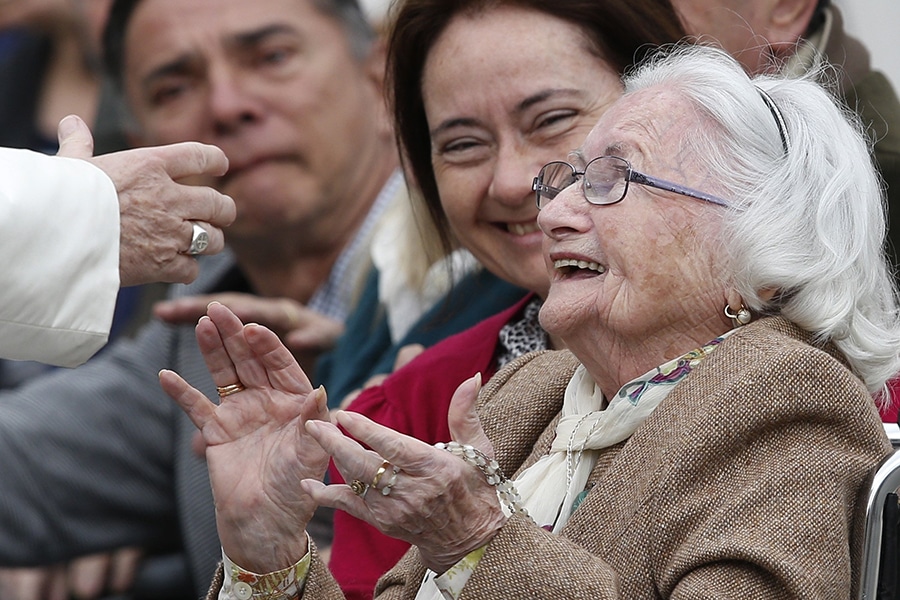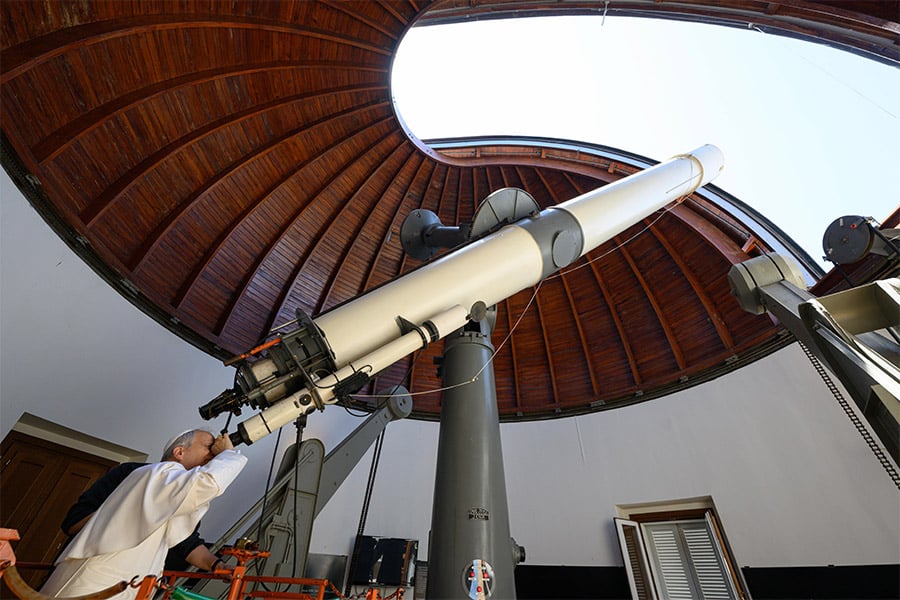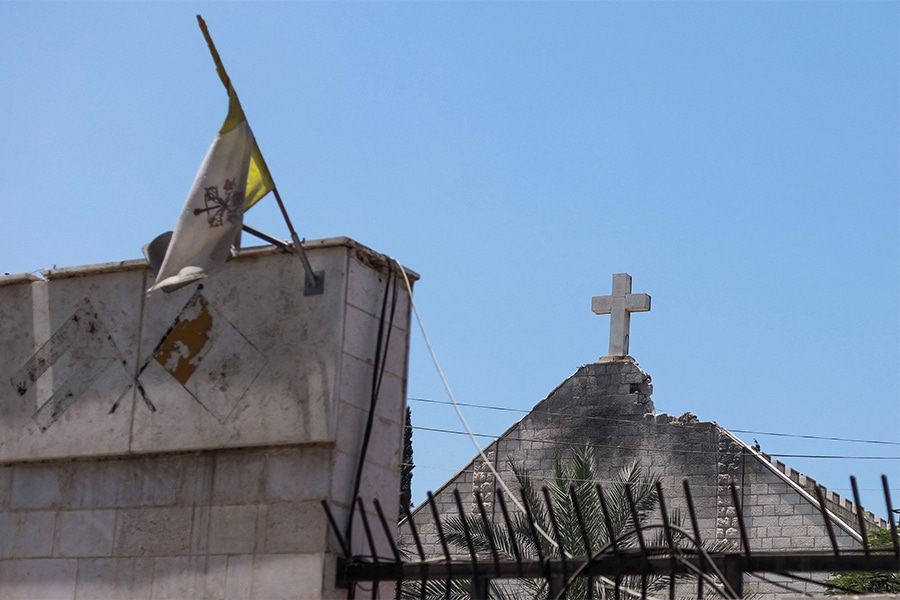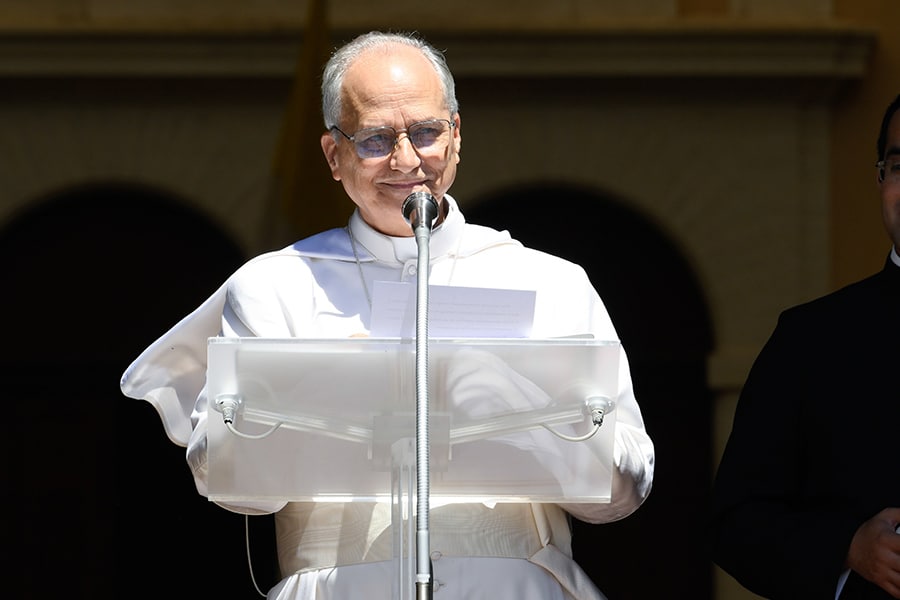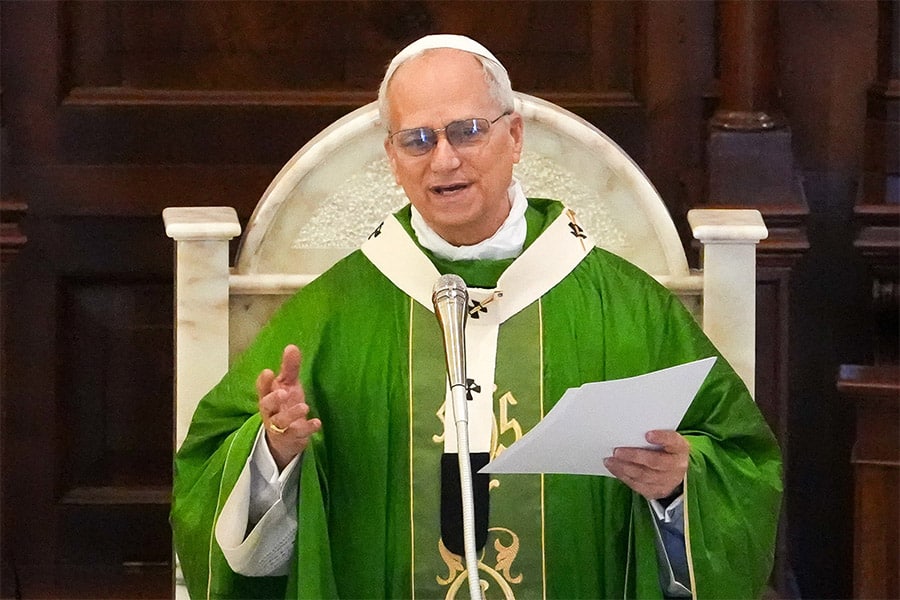VATICAN CITY (CNS) — There have been “various signs” in modern times that have prompted a new awareness of the Gospel and how great God’s love for humanity is, a theologian and consultor for the Dicastery for the Doctrine of the Faith said.
These signs include the Catholic Church’s hope of salvation for infants who die without being baptized, the inadmissibility of the death penalty and the recent declaration opening the possibility of non-liturgical blessings to gay and other couples not married in the church, the consultor, Michelina Tenace, said in an article published in the Vatican newspaper, L’Osservatore Romano, July 30.
The nearly 3,000-word article titled, “A ‘trust’ that invites us to supplicate,” revisited the meaning and intention of the declaration, “Fiducia Supplicans” (“Supplicating Trust”), on “the pastoral meaning of blessings,” published by the dicastery in 2023 and approved by Pope Francis. Tenace, who is a consecrated laywoman and theologian, was one of the three women the pope appointed to the dicastery in 2018 to be active contributors as consultors. It was the first time women and laypeople were appointed to that role in the doctrinal office.
The declaration, she wrote, echoes Pope Francis’ invitation “to look at the mystery of the human condition from the ‘peripheries’ of the church,” like the shepherd who goes in search of the lost sheep.
“The shepherd who goes in search of the lost sheep is not failing to care for those who have come into the fold,” she wrote. “On the contrary, the shepherd hopes that the danger he puts himself into in order to save the one (sheep) will be an occasion to strengthen prayer for him, the shepherd,” and to increase “compassion for the sheep in distress and gratitude on the part of those who dwell in ‘his’ home.”
She wrote that the declaration reflects that teaching and “takes into consideration the fact that when the children (of God) implore with trust — according to the measure of the wound of their heart — the Father’s response is according to the infinite measure of mercy.”
Over time, the pronouncements and gestures of the church demonstrate a theological coherence that supports its doctrine, Tenace wrote.
After the dicastery’s response in 2021, which determined the church does not have the power to give a blessing to unions of persons of the same sex, the dicastery offered a new and “innovative” way to look at blessings with its declaration in 2023, she wrote.
The novelty, she wrote, is determining that “what is not possible in a sacramental liturgical context is possible in a pastoral practice, without changing in any way the Church’s perennial teaching on marriage,” which is only a life-long union between a man and a woman.
The declaration says in certain circumstances and with proper discernment, priests can give brief, spontaneous, non-sacramental, non-liturgical blessings to the individuals making the request who are in irregular situations or who are a same-sex couple “without officially validating their status” or blessing the union. “These blessings, outside of any liturgical context and form, do not require moral perfection to be received,” Pope Francis had said.
Without directly discussing the opposition or controversy sparked by the declaration, Tenace wrote that, “We are accustomed in the Church to dealing with pastoral issues that raise fruitful theological debates to deepen doctrine.”
The church’s engagement with the world, “for which Christ suffered, died and rose again,” always offers the church, “which is the body of Christ, an occasion to deepen her understanding of the Lord himself and of his love, and indeed of herself, an occasion to penetrate more deeply the message of salvation entrusted to her,” she wrote.
There have been “several signs of our modern times that prompt a renewed awareness of certain aspects of the Gospel” that have particular relevance to the subject of pastoral blessings and how the desire to offer pastoral care is at the foundation of church doctrine, she wrote.
Two examples of change emerging from this interaction between “doctrine and pastoral urgency” are the International Theological Commission’s document, approved by Pope Benedict XVI in 2007, on “The hope of salvation for infants who die without being baptized” and Pope Francis’ approval in 2018 of a revision of the Catechism of the Catholic Church declaring the death penalty is inadmissible.
The issue of the salvation of children who die without baptism was a long-debated topic, Tenace wrote. After centuries of “the theology of limbo, which was a permanent condition of children who die without baptism, being accepted, there was a ‘clarification’ based on an anthropology of solidarity.”
The document did not deny the necessity of baptism as the way to achieve salvation in Christ, she wrote, but it did explore the Christian sense of hope that there may be other ways to achieve the same end and that God’s mercy would allow children unable to receive the sacrament of baptism “to participate in his vision, by grace, that is, to enter salvation.”
The doctrine on the sacrament of baptism did not change but there was an expanded understanding of God’s mercy, she wrote.
Concerning the death penalty, she added, there was “a development of the understanding of the dignity of the person in the light of the Gospel,” which led to the church finally “distancing itself from a human, civil tradition” of capital punishment, which the church had recognized, for centuries, as a legitimate right of civil authorities to impose.
“These two examples are just a few among many that church history offers us,” Tenace wrote. “The declaration about the possibility of blessing same-sex couples fits perfectly into this vocation of theology, of constantly making accessible the theological understanding of doctrine to offer a vision that draws together the doctrinal aspects with pastoral ones in a coherent manner.”
“Fiducia supplicans” confirms the doctrine on the sacrament of marriage while allowing ministers to take care and respond to the request of people who live “in a union that cannot be compared in any way to a marriage and who desire to entrust themselves to the Lord and his mercy, to invoke his help, and to be guided to a greater understanding of his plan of love and of truth,” she wrote, citing the declaration.
Therefore, she wrote, “The gesture of blessing two persons in an irregular situation should not be considered an error or infidelity to Catholic doctrine.”
Tenace ended her article with a section calling for further study on the different types of “irregularity” since a male-female couple and a same-sex couple “raise different issues.”
“Certainly, pastoral practice takes into account the difference there is between a couple in the situation of an ‘irregular union’ when it is a couple consisting of a man and a woman and a couple living in the situation of an ‘irregular relationship’ when it is a same-sex couple,” she wrote.
“It helps to remember that Pope Francis wanted to specify that one does not bless the union, but simply the people who together have requested it,” she wrote, adding that “there is no shortage of elements to bless in same-sex couples” when it is considered “there are many kinds of relationships: between friends, between parents and children, between siblings, etc.”
“However, for the Catholic Church, the sexual relationship is considered specific to the gift of self between a man and a woman in the marriage union. So much so that, otherwise, recourse to sex is considered an expression of a ‘non-regular’ relationship and can be spoken of as ‘sin’ not due to an obsession with sexuality, but rather because of a high esteem for the reality of the differentiation between male-female as God’s gift to creation that marks the greatness and limitation of human beings,” she wrote.
In fact, the original sin was the human being rejecting the gift of creation “because of the limitation that God placed on it and thus also perverts the gift of greatness. Sin is not recounted as something about sex, but it is about ‘knowledge,’ the desire to ‘possess’ … to possess everything,” she wrote.
In terms of faith, being either male or female according to birth, “represents the scope of the limitation that is placed on us as human creatures, male or female, to access through sexual identity the mystery of the union that is possible between a man and a woman, two persons of different sexes created to become, through love, one flesh,” she wrote.
Read More Vatican News
Copyright © 2024 Catholic News Service/U.S. Conference of Catholic Bishops

